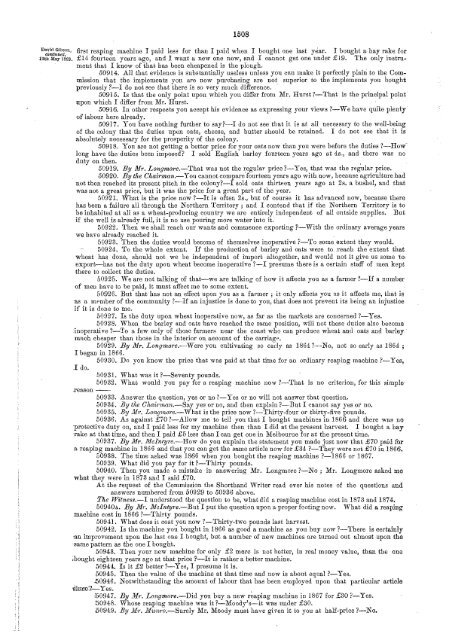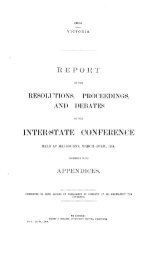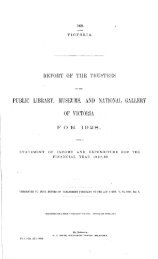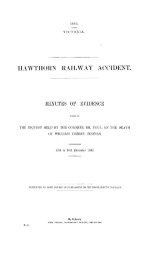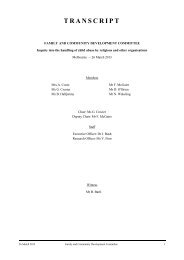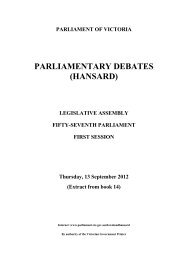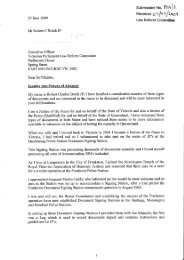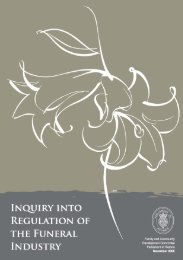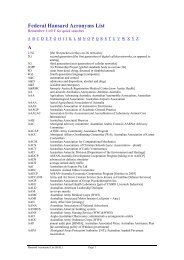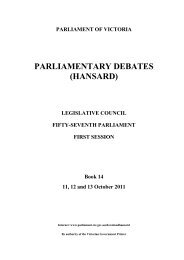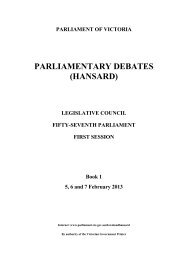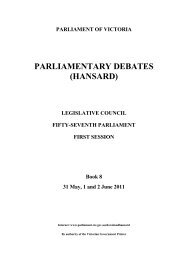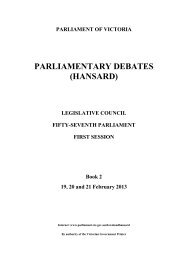Minutes of Evidence p.1401-1509 - Parliament of Victoria
Minutes of Evidence p.1401-1509 - Parliament of Victoria
Minutes of Evidence p.1401-1509 - Parliament of Victoria
Create successful ePaper yourself
Turn your PDF publications into a flip-book with our unique Google optimized e-Paper software.
1508<br />
Dav!d Gibson, first reaping machine I paid less for than I paid when I bought one last year. I bought a hay rake for<br />
ron.tinued,<br />
~2th May 1883 .. £14 fourteen years ago, and I want a new one now, and I cannot get one under £19. The only instru~<br />
ment that I know <strong>of</strong> that has been cheapened is the plough. .<br />
50914. All that evidence is substantially useless unless you can make it perfectly plain to the Corn~<br />
mission that the implements you are now purchasing v.re not superior to the implements you bought<br />
previously ?-I do not see that there is so very much difference.<br />
50915. Is that the only point upon which you differ from Mr. Hurst ?-That is the principal point<br />
upon which I differ from Mr. IIurst. ·<br />
50916. In other respects you accept his evidence as expressing your views ?-We have quite plenty<br />
<strong>of</strong> labour here already.<br />
50917. You have nothing further to say?-I do not see that it is at all necessary to the well-being<br />
<strong>of</strong> the colony that the duties upon oats, cheese, and butter should be retained. I do not see that it is<br />
absolutely necessary for the prosperity <strong>of</strong> the colony.<br />
50918. You are not getting a better price for your oats now than you were before the duties ?-How~<br />
long have the duties been imposed? I sold English barley fourteen years ago at 4s., and there was no<br />
duty on then. .<br />
50919. By Mr. Longmore.-That was not the regular price ?-Yes, that was the regular price.<br />
50920. By tlw Cltairrnan.-You cannot compare fourteen years ago with now, because agriculture had<br />
not then reached its present pitch in the colony?-I sold oats thirteen years ago at 2s. a bushel, and that<br />
was not a great price, but it was the price for a great part <strong>of</strong> the year.<br />
50921. What is the price now ?-It is <strong>of</strong>ten 2s., but <strong>of</strong> course it has advanced now, because there<br />
has been a failure all through the Northern Territory; and I contend that if the Northern Territory is to<br />
be inhabited at all as a wheat-producing country we are entirely independent <strong>of</strong> all outside supplies. But<br />
if the well is already full, it is no use pouring more water into it.<br />
50922. Then we shall reach our wants and commence exporting ?-With the ordinary average years<br />
we have already reached it.<br />
50923. Then the duties would become <strong>of</strong> themselves inoperative ?-To some extent they would.<br />
50924. To the whole extent. If the production <strong>of</strong> barley and oats were to .reach the extent that<br />
wheat has done, should not we be independent <strong>of</strong> import altogether, and would not it give us some 'toe<br />
export--has not the duty upon wheat become inoperative ?-I presume there is a certain staff <strong>of</strong> men kept<br />
there to collect the duties.<br />
50925. We are not talking <strong>of</strong> that-we are talking <strong>of</strong> how it affects you as a farmer ?-If a number<br />
<strong>of</strong> men have to be paid, it must affect me to some extent.<br />
50926. But that has not an effect upon you as a fat·mer ; it only affects you as it affects me, that is<br />
11s a mPmber <strong>of</strong> the community ?~If an injustice is done to you, that does not prevent its being an injustice<br />
if it is done to me.<br />
50927. Is the duty upon wheat inoperative now, as far as the markets are concerned ?-Yes.<br />
50928. When the barley and oats have reached the same position, will not these duties also become<br />
inoperative ?-To a few only <strong>of</strong> those farmers near the coast who can produce wheat and oats and barley<br />
much cheaper than those in the interior on account <strong>of</strong> the carriage.<br />
50929. By Mr. Longmore.--Were you cultivating so early as 1864 ?-No, not so early as 1864 ;<br />
I began in 1866.<br />
50930. Do you know the price that was paid at that time for an ordinary reaping machine ?-Yes,<br />
I do.<br />
50931. What was it ?-Seventy pounds.<br />
50932. What would you pay for a reaping machine now ?-That is no criterion, for this simple·<br />
.reason--<br />
50933. Answer the question, yes or no ?-Yes or no will not answer that question.<br />
50934. By tl!e Ghairnwn.-Say yes or no, and then explain ?~But I cannot say yes or no.<br />
50935. By lif.r. Longmore.-What is the price now ?-Thirty-four or thirty-five pounds.<br />
50936. As against £70 ?-Allow me to tell you that I bought machines in 1866 and there was no<br />
11rotecl:ive duty on, and I paid less for my machine then than I did at the present harvest. I bought a hay<br />
rake at that time, and then I paid £5less than I can get one in :Melbourne for at the present time.<br />
50937. By Mr. lYicintyre.--How do you explain the statement you made just now that £70 paid for<br />
a reaping machine in 1866 and that you can get the same article now for £34 ?-They were not £70 in 1866.<br />
50938. The time asked was 1866 when you bought the reaping machine ?-1866 or Hl67.<br />
50939. What did you pay for it ?-Thirty pounds.<br />
50940. Then you made a mistake in answering Mr. Longmore ?-No; Mr. Longmore asked me<br />
what they were in 1873 and I said £70.<br />
At the request <strong>of</strong> the Commission the Shorthand Writer read over his notes <strong>of</strong> the questions and<br />
answers numbered from 50929 to 50936 above. ·<br />
The Witness.-I understood the question to be, what did a reaping machine cost in 1873 and 1874.<br />
50940A. By 1Wr. lrlcintyre.-But I put the question upon a proper footing now. What did a reaping<br />
machine cost in 1866 ?-Thirty pounds.<br />
50941. What does it, cost you now ?-Thirty-two pounds last harvest.<br />
50942. Is the machine you bought in 1866 as good a machine as you buy now ?-There is certainly<br />
·an improvement upon the last one I bought, but a number <strong>of</strong> new machines are turned out almost upon the<br />
·same pattern as the one I bought.<br />
50943. Then your new machine for only £2 more is not better, in real money value, than the one<br />
;bought eighteen years ago at that price P-It is rather a better machine.<br />
50944. Is it £2 better?-Yes, I presume it is.<br />
50945. Then the value <strong>of</strong> the machine at that time and now is about equal ?-Yes.<br />
.50946. Notwithstanding the amount <strong>of</strong> labour that has been employed upon that particular article<br />
'Ei:i.u:t:re:1--Yes.<br />
<strong>1509</strong>47. By 1Jfr. Longmore.-Did you buy a new reaping machine in 1867 for £30 ?-Yes.<br />
:50948. Whose reaping machine was it ?-Moody's-it was under £30.<br />
i50949. By ~}fr. 1Yfunro.-Sure1y Mr. Moody must have given it to you at half-price ?-No.


